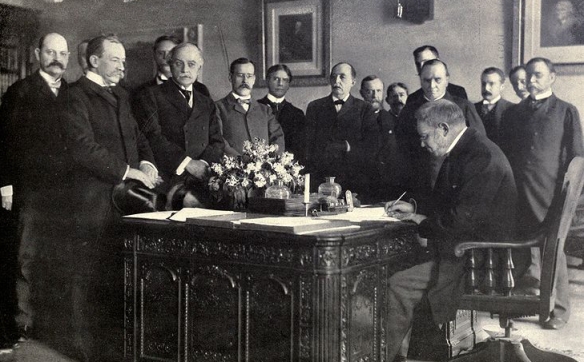
The Treaty ending the Spanish American War and transferring control of Cuba, Guam, Puerto Rico, and the Philippines from Spain to the United States. The acquisitions of these territories gave the United States a global presence and thrust the country further into the imperial rivalries in the Far East and Latin America. Major issues at the peace conference, which lasted from October 1, 1898, to December 10, 1898, dealt with responsibility for the Cuban debt, valued at $400 million, and the status of the Philippines. The Cuban debt represented the expense of Spanish administration of Cuba, the cost of suppressing previous Cuban revolts, and the price of several other Spanish ventures in the Western Hemisphere. Although Spain wanted the United States to assume responsibility for the debt, American representatives refused to accept the responsibility or to force it on any future Cuban government. In compensation and to lessen the loss of the Philippines, the United States agreed to pay Spain $20 million.
Acquisition of the Philippines proved controversial, especially in the U.S. Senate, and led to the formation of the American Anti-Imperialist League, which campaigned extensively for the defeat of the Treaty of Paris. The treaty seemed doomed to failure until William Jennings Bryan, the Democratic candidate for president in 1900, urged his supporters to vote for ratification. Bryan supported the treaty because he wanted the upcoming presidential election to focus on domestic issues and because passage of the treaty would allow the issue of American imperialism and the Philippine question to be separated from the peace negotiations. The move stunned the anti-imperialists and gave the treaty the boost it needed in the Senate. The Senate approved the Treaty of Paris 57 to 27 and President McKinley signed the treaty on February 6, 1899.
FURTHER READING: Brands, H. W. Bound to Empire: The United States and the Philippines. New York: Oxford University Press, 1992; Healy, David. The United States in Cuba, 1898–1902: Generals, Politicians, and the Search for Policy. Madison: University of Wisconsin Press, 1963.